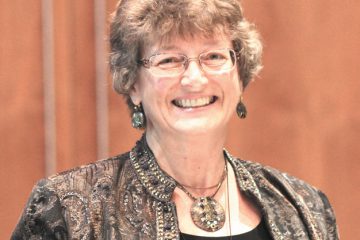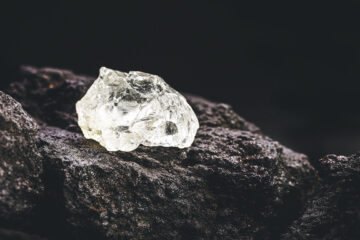A woman of valor
The Jewish Family Identity Forum
By Candace R. Kwiatek, The Dayton Jewish Observer

“A woman of valor, who can find? Her price is above rubies…” Known as Aishet Chayil, these and the subsequent lines of Proverbs comprise the traditional tribute recited by a husband to his wife on the eve of Shabbat.
With poetic eloquence, the verses describe the various qualities for which the wife is praised: goodness, industriousness, generosity, wisdom, and cheerfulness.
Hearing these verses has taken on added significance since completing my most recent series of columns on biblical children.
Their stories make clear that the adults they became represented choices made throughout their lives.
And even though the biblical children include few females, we can extrapolate that the women of the Bible — Sarah, Miriam, the daughters of Zelophehad among others — also invented themselves through the choices they made during their lives.
Thus, Aishet Chayil is a particularly praiseworthy litany because it reflects positive behavioral choices that create an admirable individual, choices that ultimately have a significant impact on others.
How does one become a woman of valor like the one praised in Proverbs?
The Bible offers very few role models and even fewer clues; nearly all the women are adults when we meet them. Even then, we only get a glimpse. Perhaps the answer can be found in a personal example.
I recently attended the funeral of an elderly woman, Anja, whom I had known for decades.
During the service, a moving “presentation of gifts” ceremony was offered in her memory.
While a traditional eulogy uses narrative to highlight the virtues and accomplishments of the deceased — and thereby express the immense loss her death represents to family, friends, and community — this wordless ceremony seemed to have a different focus: how did this person become Anja? How did she create herself? And what is her legacy?
Where do you come from? The first gift was a doll dressed in the traditional garb of Lapland, representing Anja’s ongoing celebration of her Finnish heritage.
Letters to overseas friends and relatives, frequent visitors, and her own travels allowed Anja to maintain her Finnish language skills, learned as a youngster.
Anja’s conversation was often peppered with Finnish words or phrases, and her very name prompted conversations about her origins.
Her menus often had a hint of Scandinavia — salt fish, caraway and cardamom, a coffee bread called nissu — and her good china was actually Finnish glass.
Commenting on her Finnish temperament, Anja’s treasured coffee mug read: “You can always tell a Finn, but you can’t tell ‘em much.”
Even her interests in architectural styles and fabrics reflected cultural connections.
What can we learn? Celebrate your origins and make your heritage part of who you are every day.
What is your attitude? Anja had an incredible ability to persevere in the face of adversity, symbolized by a photo album, a tiny battered suitcase, and a cane.
On a pleasure trip to Finland to visit relatives, the 3-year-old Anja and her younger sister Kay were left alone when their mother unexpectedly died there.
Raised by a grandmother in a foreign land for five years, Anja and the 6-year-old Kay eventually traveled back across the Atlantic, alone, to join their remarried father — who died two years later.
Heartbroken and destitute, the widowed stepmother couldn’t care for the girls, so Anja and Kay were sent to live with family friends on a farm through their teen years.
Anja’s life settled down for a bit: work, marriage, family. But for the last four decades of her life she battled two forms of cancer, severe arthritis, heart disease, and diabetes, among other ailments.
Yet, Anja lived an Eleanor Roosevelt life: “Life is what you make it. Always has been, always will be.”
No matter what came her way, she handled it with determination, a smile, and an air of grace and calm. What can we learn? Focus on the good and ignore the rest. Life — and who you become — is what you make it.
How do you choose to live? Throughout her life, Anja pursued the arts and related skills both for her own pleasure and to benefit her family and community.
Just a few of her many talents were evident in the ceremonial gifts of an oil painting, teddy bear, quilt, and crocheted baby blanket.
Anja studied with several professional artists and became a talented oil painter of stilllifes and landscapes; she was once surprised to discover one of her pieces in a neighbor’s home.
Much-needed renovations of the family home challenged her to learn how to make architectural plans and renderings, and her sketches of local historical buildings became part of a series of published note cards.
She learned gardening, landscaping, and even bricklaying to beautify her home.
Anja appreciated beautiful furniture and fine clothes, so she taught herself sewing and dressmaking: everything from draperies and upholstery to coats and evening gowns.
Extremely talented in fiber arts, she could quilt, knit, and crochet. Anything she saw she could duplicate. She was always working on multiple projects to be given away to family or fund-raising ventures.
Crippled by arthritis in her last days, Anja was still working on a quilt for her upcoming great-grandson.
What can we learn? Everyone has gifts: put them to work. Fill your life with meaningful pursuits.
And no matter what your circumstances, you can always do something meaningful for others. Look for the opportunities.
A woman of valor, who can find? In Proverbs we express the qualities of the exemplary wife, mother, and friend, the self-made woman whose “price is above rubies.”
In my home, my mother chose every day to be such a woman of valor. Her name was Anja. Her loving guidance and courageous example will be missed. May her memory be a blessing.
Family Discussion: What memorial gifts would represent you: your heritage, your character, and your impact on the world? How would they illustrate that you created yourself? Are you leaving a meaningful legacy?
Literature to share
The First Gift by A. S. Gadot: This simple, strikingly-illustrated picture book introduces the idea of Jewish names and naming practices, connecting them to the Bible’s first names of Adam and the animals. The First Gift would be an excellent read-aloud tale with young children, a guaranteed discussion-starter about their own names.
The Honored Dead: A Story of Friendship, Murder, and the Search for Truth in the Arab World by Joseph Braude: The Middle East is on everybody’s radar, yet it’s difficult to really know what life is like for the majority of Arabs there without serious academic study. That’s why Braude’s nonfiction book is such a treat: as a journalist in Morocco, he helps a friend with a mysterious quest that takes him through many layers of society.
Candace R. Kwiatek is a writer, educator and consultant in Jewish and secular education.



